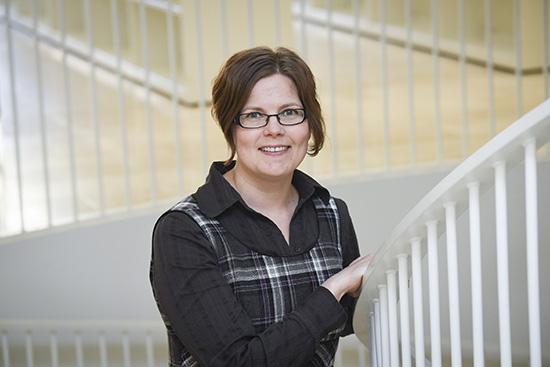Sanna Kopra is researching China’s climate policy and Arctic policy. As a researcher, she is motivated by environmental concerns and the pursuit of social justice.
Kopra spent the first months of the year in Tromsø. By the sea, embraced by the mountains, she really felt that she was in an Arctic city. She has not captured the same feeling in Rovaniemi.
– Perhaps Rovaniemi is so familiar that it doesn't feel like an Arctic city, Kopra reflects.
During her studies, Kopra lived in Rovaniemi for many years and has often returned to the city. Since last autumn, she has worked in the Arctic Centre with The rise of China and normative transformation in the Arctic region – a research project funded by the Academy of Finland.
Kopra lives in Mäntsälä countryside with her family, dogs and chickens. She works mostly at home, but travels to the Aleksanteri Institute of the University of Helsinki a couple of times a week. She works there as a visiting researcher and shares an office with her colleagues.
– It is important to be part of a work community also physically, not only remotely.
As a researcher, Kopra is known for her long-term interest in China's climate policy. She started with the topic already when she was doing her bachelor and master studies at the University of Lapland. In her doctoral research at the University of Tampere, she discussed China's concepts of responsibility in climate policy. Kopra has been on an exchange in China twice – one year in Beijing and six months in Shanghai - and she speaks Chinese. A little surprisingly, she does not define herself as a China researcher, however.
– I am primarily a political researcher. I do not want to get too deep into China's domestic policy, because my interest is in international politics.

Kopra's research topics are breathtakingly broad: China's climate policy and Arctic policy. How is it possible to master such themes?
Kopra approaches her topics from a theoretical viewpoint. She doesn’t even try to explore everything that China is doing or is planning to do in climate policy. Instead, she looks at the topic through the concept of climate responsibility of major powers, for example.
– What kind of responsibility could we require of the great powers in climate policy? What does this mean in the Arctic context?
Traditionally, we talk about great power responsibility in matters concerning international peace and security. The starting point is that great powers have greater responsibility for world peace than other countries.
– Because climate change is challenging international security, we could think that great powers also have a greater responsibility for mitigating the effects of climate change and for adapting to them. But how should the great powers assume their responsibilities? Should they set an example to other countries or play a leading role in international climate negotiations?
In Finland, we also refer to the greater responsibility of the great powers when people ask why Finns should fly less, eat less meat or drive less, "when China is doing nothing".
– That is no longer true. It is true that China is still building and investing in coal power, but at the same time China is much more cooperative on climate issues than the United States, for example – and China's role is constantly increasing.
Blaming China is contradictory, anyway, as we have outsourced a significant part of our own production – that is, our emissions – to China. Yet, our emissions per capita are higher.
As a researcher, Kopra is motivated by environmental concerns and a belief in social justice.
– I want to do my part to promote peaceful cooperation and intercultural understanding.
Sanna Kopra
- Postdoctoral researcher
- Works at the Arctic Governance Research Group at the Arctic Centre
- Research interests are international politics, especially China’s environmental policy and Arctic policy
- Motto: ”The aim of research is to make the world a better place for everyone.”
- Homepage and profile in the Lacris research database
Read more about China in the Arctic region.
Text: Marjo Laukkanen
Photos: Kimmo Brandt